When he was 12 years old Steven Skrzybski scored against Hertha BSC in the season’s decisive fixture. Union had won every single game that year bar one in the cup. They had destroyed the competition, torn the league up, but here in the D-Jugend final they had conceded two stupid goals and 400 people were watching them trying not to throw all that promise away. The ball came to him on his right foot, where he likes it best, and he raced on, drifting out towards the right, a trait he still has, but it looked like he had left too tight an angle to shoot.
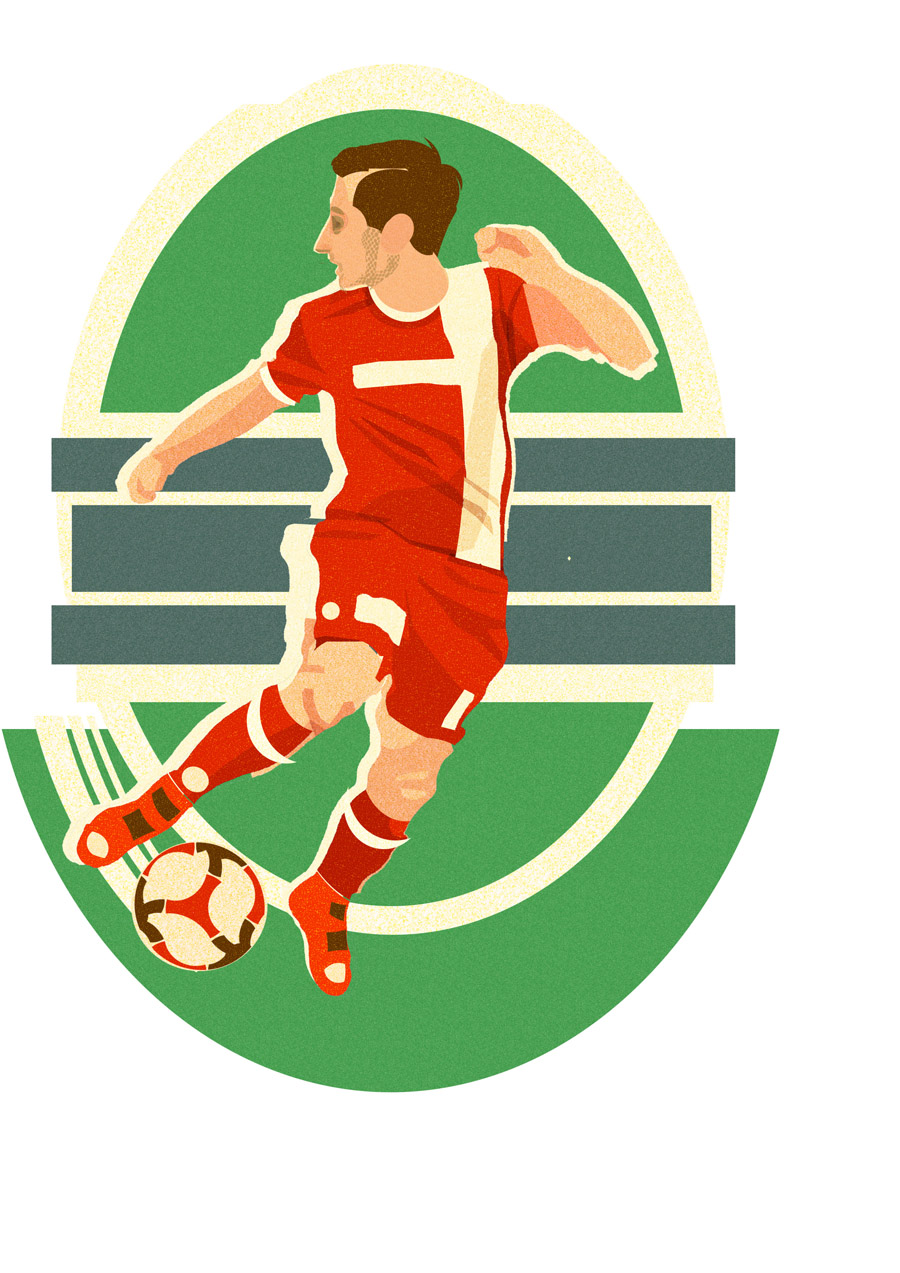
For the partisan crowd it was a happy occasion and even the slightest of bragging rights in a city whose two biggest clubs still hadn’t played against each other in earnest for two generations would be worth it. But they were still only kids, it was hardly seismic. “There was no pressure back then”, he says now with a grin on his face as wide as the North Atlantic. He’d already been at Union for over half his life, even then. “It was all we knew, we were just… playing football”.
Instinct took over. He shot without thinking, back across goal, inside the far post, high and hard and true. And the scream he let out into the otherwise placid skies above leafy, bourgeois Lichterfelde was quickly drowned out by those of the 200 or so parents and fans, who were supporting the red half of the city, as the ball hit the back of the net.
“There are some things you never forget”, he says, though he also understands implicitly (and certainly more than most) the need to enjoy every single goal like it is your last. He celebrated that goal with his mates, Boné Uaferro and Kilian Pruschke and Oli Hofmann and Lukas Rehbein, and Robin Huth and Tom Trybull and all the others. Union would go on to win the match and the bragging rights, and the players would simply move seamlessly up to the next age group and the next season at the next level. From the D to the A-Jugend, from little kids to young men, they stayed mostly together, learning to play football with no pressure or expectations. “That’s probably why I try to think back to those times, when it was just fun, when no-one thought about what money they could earn, or about crowds or whatever.”
The players on that record breaking team who beat anyone who came near them in 2004-05 don’t get to see each other very often any more, their lives have gone in different directions. It would be sadder were it not so often the case in football.
Skrzybski was, as Pruschke, the goalkeeper in those sides, says now, “Fußball verrückt”, football crazy. It was all he thought about, all he talked about and all he did. He was also nice and quiet and good mannered and utterly unsuitable for a story about the pitfalls of young fortune and the temptations of Berlin to a kid on top of the world. In an interview he did, reprinted in the programme for Union’s match against Karlsruhe in 2013, he told a story about how he’d still help out at his folks’ bakery in Mahlsdorf if need be, because “it is a family business… I’ll even do the washing up there if it needs to be done.”
Now, in November 2016, he sits at the top of the pyramid, his former team-mates left, somehow, behind at different stages on the way up. His five goals this season have come almost every other game, compared to his seven spread over the previous five seasons. His impish chip over the head of former team-mate Daniel Haas away at Aue a couple of weeks ago was a delight, an artful piss-take, a combination of being both smart and clever at the same time. The equaliser from 25 yards in the boiling cauldron of the Westfalenstadion in the cup against Borussia Dortmund a few days later was simply devastating. He had been on the pitch for all of a minute when he swung his right boot, first time, and battered the ball through the box and inside the far post, turning the game and almost making history.
But this didn’t happen by chance. Not so long ago, after the 2-2 draw with Dresden that saw Uwe Neuhaus return to the club where he first introduced Skrzybski to the team, the striker approached his often difficult and spiky former boss to thank him for all he had done. Neuhaus just laughed. He knew that he had done little. He had just done what every single other one of his coaches had done. Because he’d seen the spark of desperation in his eyes, the need to make this happen and the will to see it through, whatever he had to do. Every coach on Earth would want a young player as talented as him. But more importantly they would also all want a player as dedicated as him. He would run through walls for you if it meant he could play next week.
From that D-Jugend side Trybull was undoubtedly more technically able than Skrzybski on the ball, Pruschke was excelling in a far less crowded field, and Hollwitz was stronger by far. He would then join Christopher Quiring and Errol Zejnullahu in the under 23’s who were, respectively, quicker and trickier. And everyone, just everyone knew that Uaferro would go on to be the best footballer the city had produced since Thomas Häßler.
Yet, he has left them all behind.
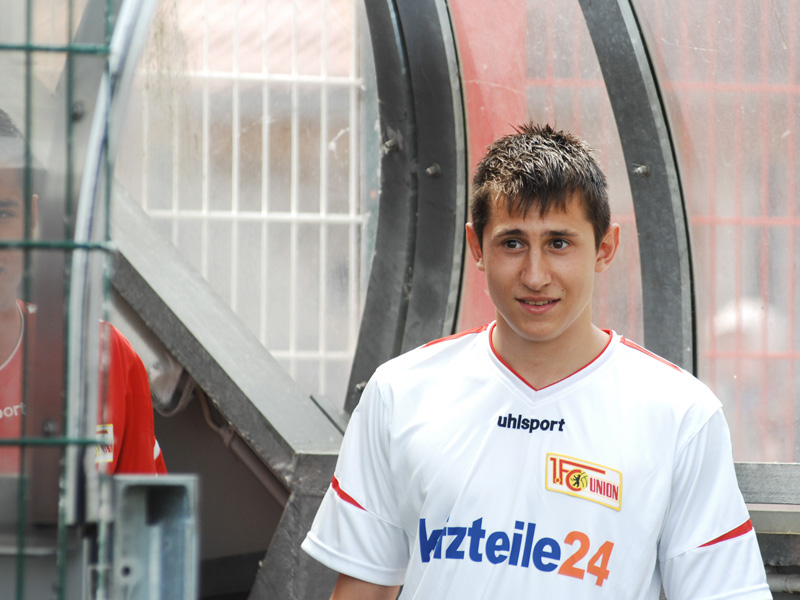
“I had a little bit of luck, sure, but as a kid there were things I had to ignore, that I passed up. Especially when you get to 15, 16, 17 and 18. It’s the typical stuff. There were parties, for some alcohol was a decisive factor, or smoking…” This was Berlin a decade after the wall came down. It took willpower to miss out, it took strength of character. “I knew then, in the D-Jugend, that I wanted to become a professional, so I turned it all down knowing that later I could never say “that’s why it didn’t happen”.
Pruschke takes the story on. “Technically he was relatively good, but the question was always going to be physically.” Skrzybski was tiny, but he was hardly Leo Messi. Or Icke Häßler, for that matter. “He always gave something extra after training, whether on the weights, or whatever. And so he really had the trust of his coaches. They always believed in him.” Andre Hofschneider was particularly important. He was gutted he could never play for him as the permanent number two suddenly found himself in the top job for the last part of last season. Skrzybski wanted to give him something back, Hofschneider had done so much for him from day one. It was he who had persuaded Neuhaus to take a chance on him.
I was once told that the senior players called him “split-screen” when he joined their ranks. This may or may not be true, but it is usually a decent sign of acceptance if the bigger boys have noticed you enough to take the piss. Torsten Mattuschka was dominant in what passed for the Union dressing room before and after the rebuild of the Alte Försterei. He was the alpha male, the king of the container, and he took him in, too. “Sometimes you get impatient, you want to travel the world and be a shooting star… And you think you’re the best, but you are also watching the other players playing. I was lucky because I was supported very well by other members of the team. I showed them respect and they looked after me.” Tusche and particularly the man he describes still as a “legend”, Karim Benyamina, a little Berliner with a taste for goals, took him under their wings.
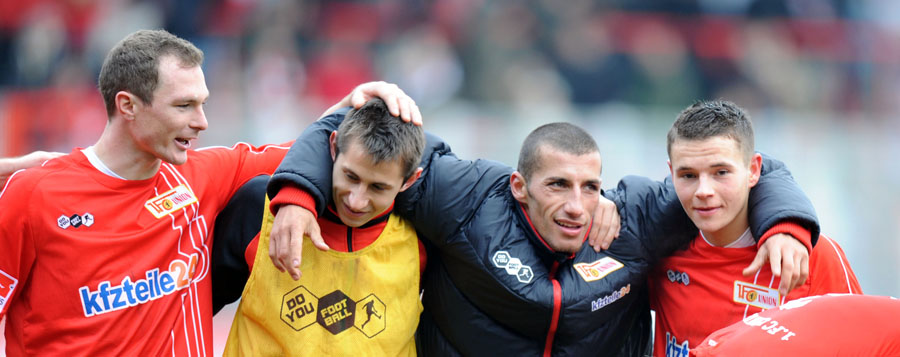
Pruschke thinks that it is because of his work ethic that he got on in that strangely shitty time when he was forever swapping between the under 23’s and the pro’s, his head spinning. In the two seasons 2012-13 and 2013-14 he played 27 times in the Regionalliga Nordost and 22 times in the 2.Bundesliga. It must have been bewildering, not knowing where he fit, constantly thinking he had made the breakthrough to the big time before being slapped back down, and instead of hearing his name bellowed at the stadium where he had been a ballboy in front of the Waldseite, he would be at the Jahn Sportpark or the Hans Zoschke. And instead of getting a chance to play in the first derby against Hertha, he would play one against BAK or Viktoria.
He made his debut for the first team when Neuhaus brought him on in the 83rd minute of a stultifying and eventually disappointing 2-1 loss away at FSV Frankfurt on November 13th, 2010. He wouldn’t score a single goal for them until the 55th minute of a 2-1 win against Bochum on May 19th, 2013. The last day of the season. His first goal at the Alte Försterei would take longer still. December 7th, 2014.
It came 1,473 days after his home debut.
Many wondered if he was ever really going to be good enough. I certainly did, and I don’t know how he dealt with it, how he kept going to training, how he kept the smile on his face that is permanently there anyway, how he didn’t succumb to the fags or the booze, to the excesses of Berlin. Pruschke doesn’t know either. “He just kept working hard”, is all he can add. Skrzybski’s response is much the same, though he’ll also add the bog-standard caveat that scoring goals isn’t important if he’s helping to create them for someone else. “Yeah, I’ve got an ego, all strikers have to have one, but as long as the team is playing well it doesn’t matter who scores….”.
That ego must have been pretty well hidden. Because to watch what was happening to one of his peers must have stung like a crack to the skull on a winter’s morning in the Regionalliga.
Christopher Quiring, who grew up a stone’s throw away from the Kaulsdorf of Skrzybski’s parent’s bakery, in Marzahn where they both still live, had rapidly become the star of the show. He was the gobby little winger who had the world at his feet. Who said on live TV that it made him want to vomit when he saw those Hertha “Wessis” celebrating in his stadium. Who wore a Wuhlesyndikat tattoo. Quiring burst into the team in 2010/11 and the rumours were that big clubs, massive clubs, international clubs known outside of this bubble of former east Berlin, were watching him. And Skrzybski had to watch him too as he kept his head down and trained with both sides and flitted between the divisions with just his coaches and his family and his teammates driving him on.
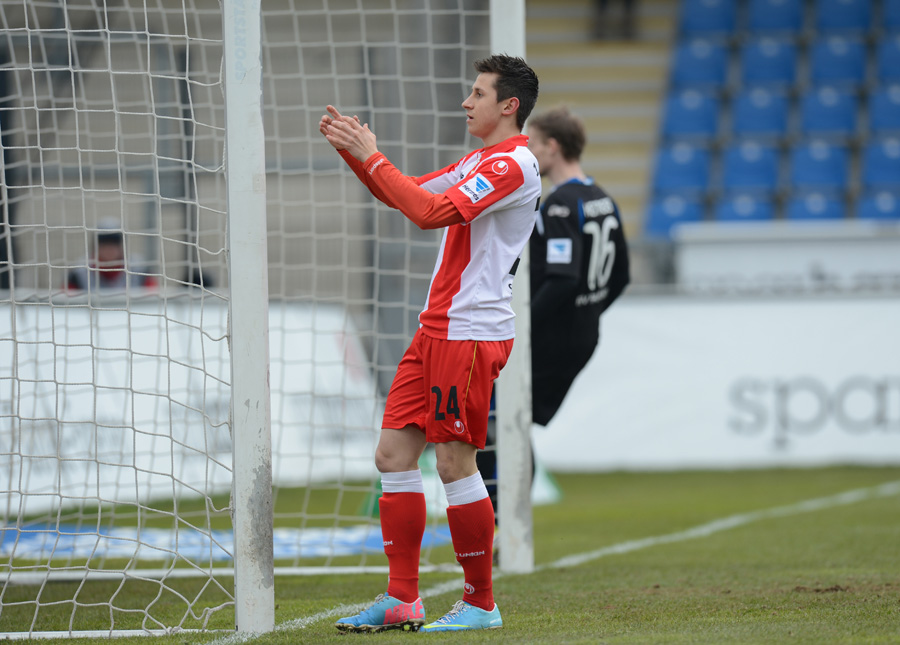
Quiring is, in many ways, the victim of his own early burst of success. He was seen by so many fans as such a huge part of the club that no-one could see his flaws in the way they did with Stevie. So he had to learn to fight his way back whilst being told from all sides in the stadium that he had an inalienable right to be there. Skrzybski says he will always be there to help advise him as Quiring did for him when he was on the fringes. Just as he will for Errol, now he is facing a similar fight. Because they know each other’s games inside out. They love to play together because they now where the other one will always be.
At some point two years later, in a game between Union’s under 23’s and a Babelsberg side who looked annoyed just to be down there in the fourth fucking flight, I wrote in my notebook: Errol passes to Stevie who passes it back to Errol who passes it back to Stevie. The game was only about three minutes old. They are enjoying themselves out there in the late autumn sun. Stevie shoots. Though it rolls just wide, he is just too good for this league.
And yes, Steven Skrzybski did always seem too good for the Fourth division, but the question remained about if he was good enough for the second. Maybe he wasn’t quite quick enough, or maybe his first touch wasn’t just there, or maybe it was his finishing that wasn’t quite sure enough. His shots did seem to roll just wide all too often. A couple of weeks later he would score five against Germania Halberstadt but that was easily dismissed. It was only Germania Halberstadt. He was scrawny looking back then. He had the uncertain haircut and bad posture of an awkward teenager. He mumbled when he spoke and he wouldn’t look his elders in the eye too much.
But now it is Chrissie and it is Errol who are struggling to impose themselves on the first team, their initial flashes of gold having been rubbed a little thinner over the last couple of seasons. And Skrzybski is flying. Gone is the lank, floppy fringe of the slightly spotty teenager. He lets his face be seen now. He seems to have grown an extra couple of inches though that could just be the straightening of his back, the more assured set of his shoulders and the confident gate of his stance.
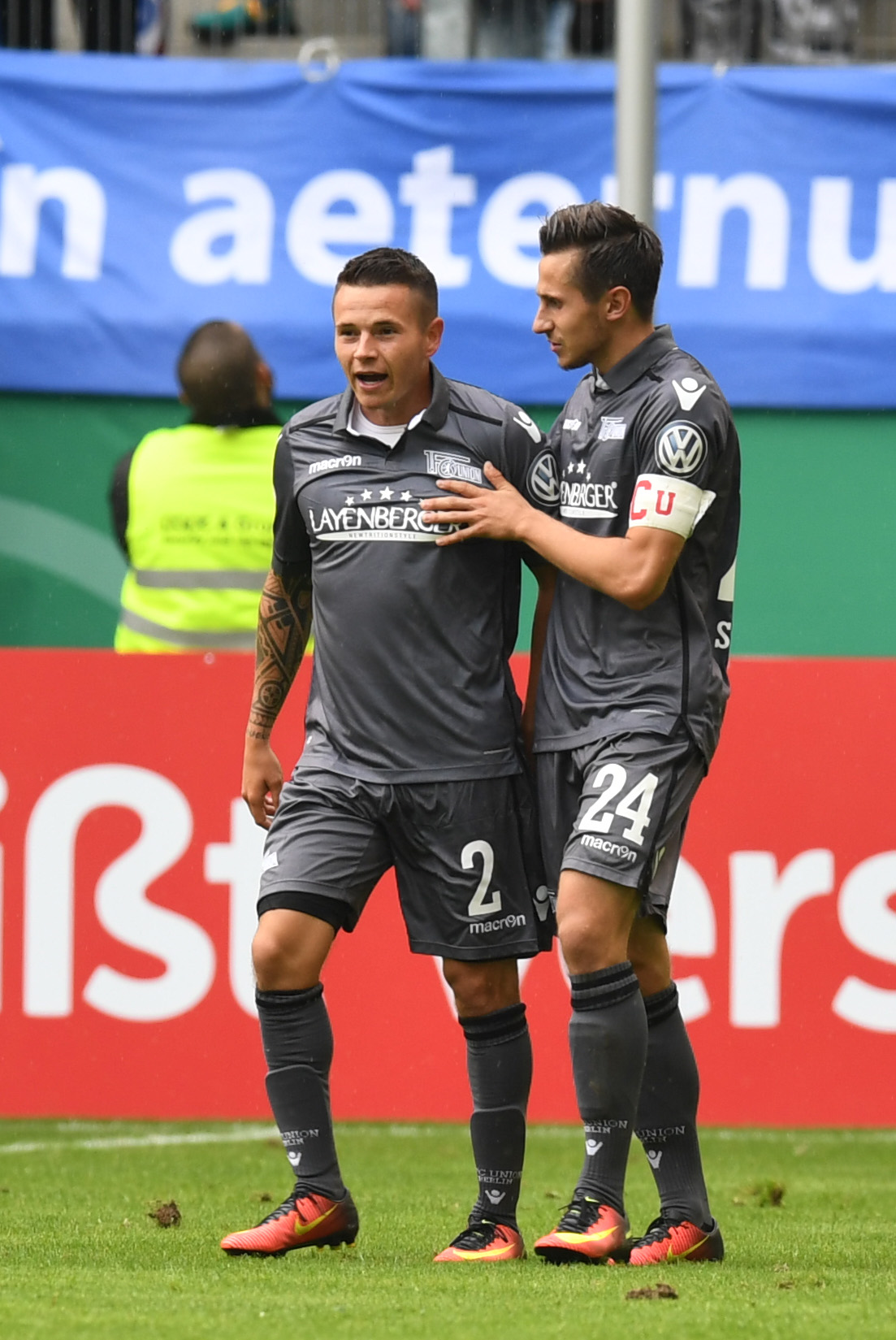
At the beginning of the season his coach, Jens Keller, had said that he could no longer simply be a prospect, a talent. He had to become a player, and he has done. He has become integral to Union and their superb start to the year, he is the cock of the walk, the first name on the sheet.
Steven Skrzybski, however, will still miss chances in a way that Benyamina never would. Because he is at his best in front of goal when he is forced to improvise, just as he did against Hertha when he was 12 years old, or as he did against Dortmund ten years later.
Uli Hesse is the author of “Tor”, the definitive history of German football, amongst his many other football books and columns. He knows his stuff. He is a Dortmund fan, but thinks Union should have won that game in the end. And he would go so far as to blame Skrzybski for this for not taking a later chance he spurned. “He had an empty goal in front of him,” he says, “then he decided to square the ball and mistimed his pass…”
Hesse is not alone is thinking Skrzybski should still score more. Against St. Pauli at home, a game in which he showed the full range of talents he has developed as a most modern of strikers, he was through one on one against Robin Himmelmann. But, again, he rolled his shot just wide.
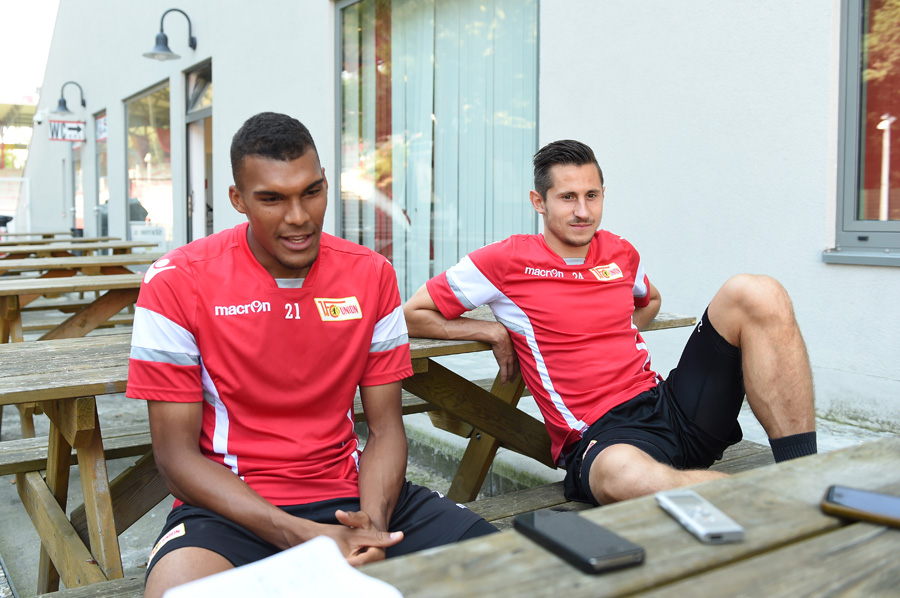
Skrzybski is determined to rid his game of this flaw, but I wonder if it is necessary, if it is even at all possible. He has seen a lot of different strikers come and go and mostly, at least relatively, fail at Union, and he’s tried to learn his lessons from all of them. But if anyone has, then it is he who has earned the right to have a little bit of leeway.
There was Silvio who could hang in the air like Superman, or John Jairo Mosquera who liked to dance a while whenever he could, holding the ball up, bringing others into play around him. The beautiful Santi Kolk drifted and floated and swooped around the pitch like a lazy, long haired angel, there for the party before pissing off with your girlfriend before the clock has struck twelve. Adam Nemec was brutal in the air and surprisingly dainty for a hulking centre forward on the floor, and Simon Terrodde could combine them all on the all-too-few occasions when things clicked just right for him.
They could all conjure a moment of inspired magic (when the good lord was willing and the Wuhle didn’t rise). Silvio’s masterpiece against Ingolstadt, for instance. Or Mosquera’s shoulder height volley against Hertha at the Olympiastadion.
But they never really earned the grace given to them when they would roll a shot just wide of the goal. None of them.
Karim Benyamina was a different beast. He was crafty and he was fast and he was also deceptively tough. He had click track timing and was so small that radar didn’t pick him up too well. He would score the spectacular and the prosaic, he didn’t care which. You just knew he would be in the right place at the right time. Benyamina and Sebastian Polter and Bobby Wood are the only real, roaring success stories as pure centre forwards in his time at Union, and two of those only ever did it over a single season.
“I learned from everyone I played with, I tried to take something from all of them”, he says, but he will always be at his best when he has to rely on his instincts. Which is why we also have to be prepared to accept the chances spurned. He is also no classic striker. He does too much else, besides, whether switching between the flanks or dropping into the midfield to help out his brothers, to give them the time and space to grasp a breath of air in the heat of the battle.
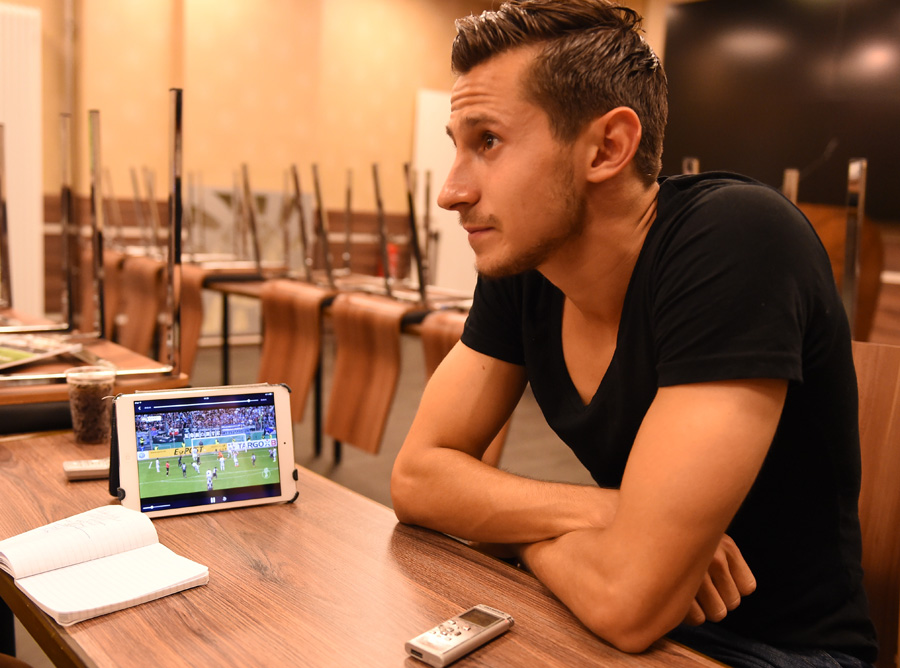
And then, he’ll have drifted into the right place at the right time and, if everything is right, the ball will be just there.
“When I have no time to think. That’s when it’s best. When everything goes silent, you can’t hear the trainers or the crowd, and you don’t hear a thing until the ball reacts and you know if it’s gone in or not. You can’t explain it, and others can’t understand it. It’s unbelievable.”
In Chinese philosophy it’s called the state of “Wu-Wei” (which translates literally as “no trying”). It is the clarity needed to be able to truly improvise. But to reach this state one has to first hone one’s skills and strengths through years and years of diligent, hard work. It takes time and practice to be able to do magical things in no time at all.
Later on he studiously ignores the comment that, in life, scoring a goal must be only akin to good drugs or better sex (he has never even tasted the honeyed joy of a single cigarette and his mother has brought him up with too good manners to talk about sex), but he waxes lyrical about the heightening of the senses that can come with the simple, artful act of putting the ball in the goal. “It can make you feel ten feet tall”, he says. “It can make you feel invincible, there is nothing comparable. In that moment you can run as fast as a leopard, you can jump three metres off the ground, you can do anything”.
His hair stands up on end like a cat’s in trouble, his smile broadens out across his face again and he trails off, wallowing, just for a moment, again in that feeling, just like when he felt it against Hertha all those years ago. There are some things that will never change.
Entdecke mehr von Textilvergehen
Melde dich für ein Abonnement an, um die neuesten Beiträge per E-Mail zu erhalten.

Thanks Sebastian for this. I never saw Santi Kolk play but I now wish I had.
Wunderbarer Artikel, einfach wunderbar!
Noch wieder ein toller Artikel von Mr. Sweetman. Steven scheint ein absolut netter Typ zu sein und ich freue mich sehr für ihn, dass er endlich Stammspieler ist.
[…] ← Vorherige […]
[…] Diese Geschichte von Jacob Sweetman erschien zuerst auf Englisch. […]